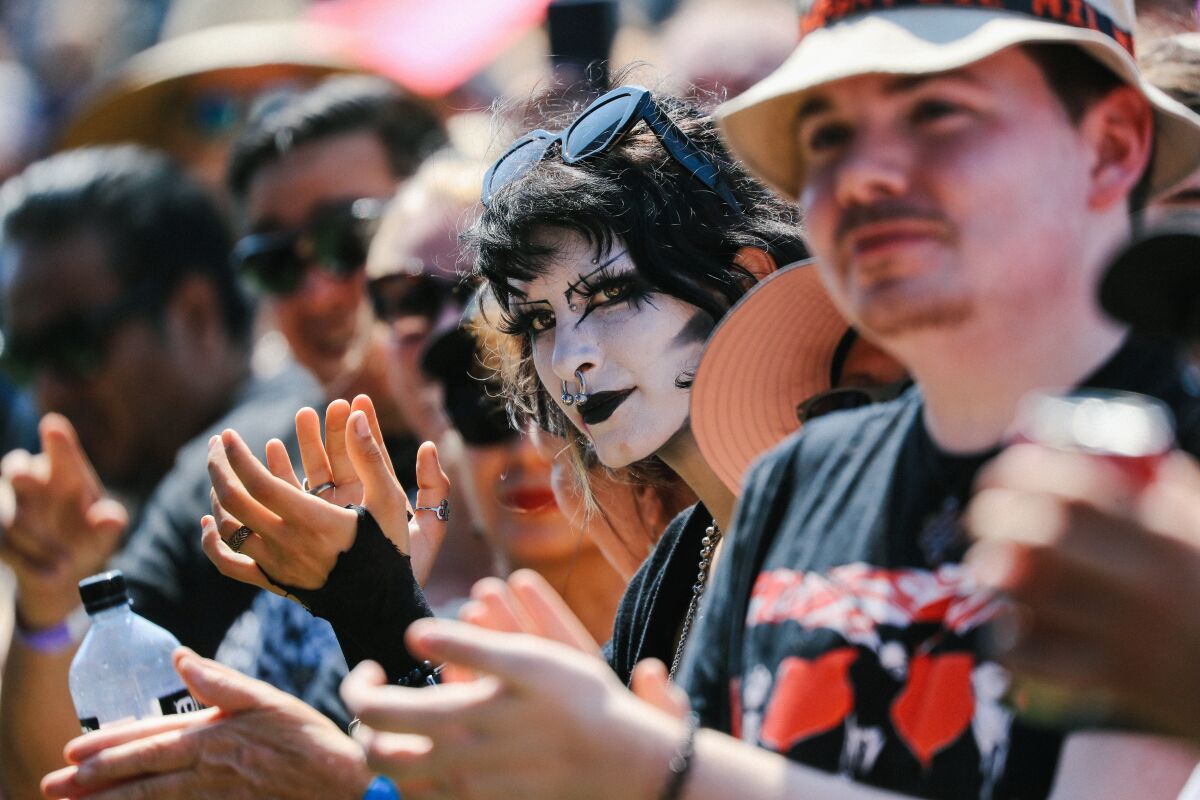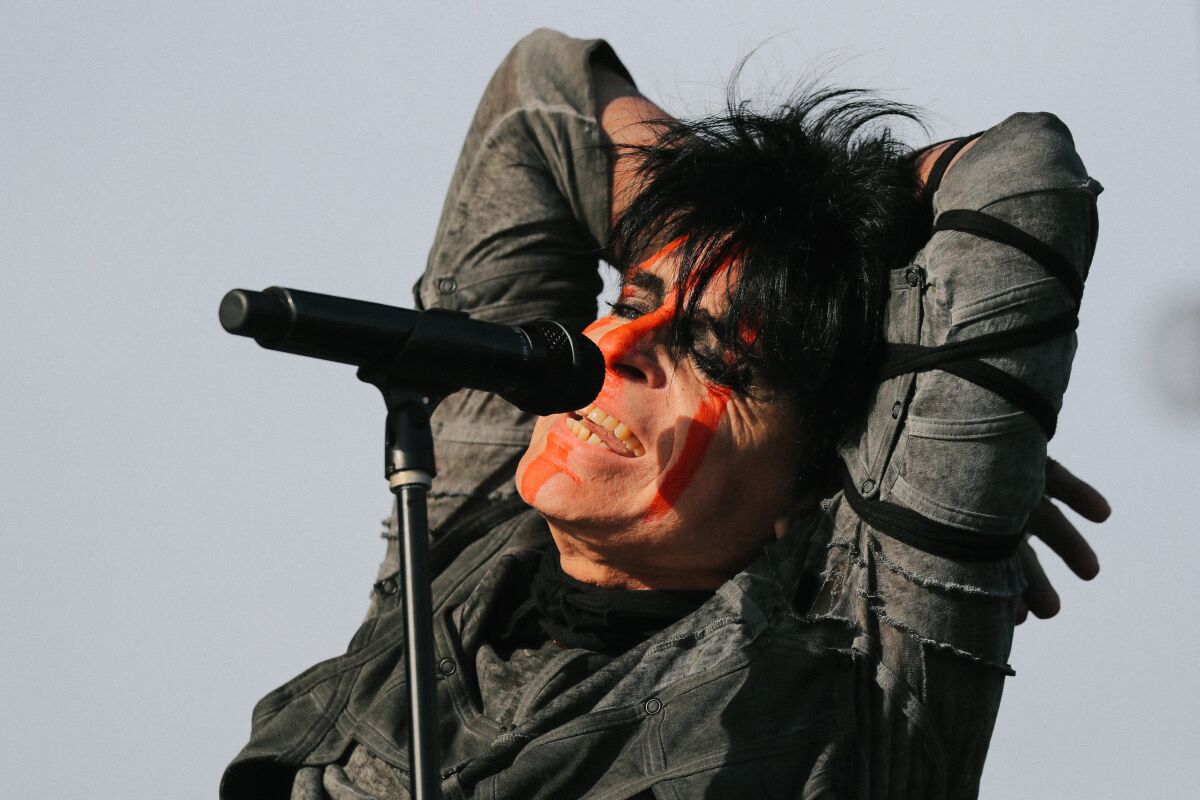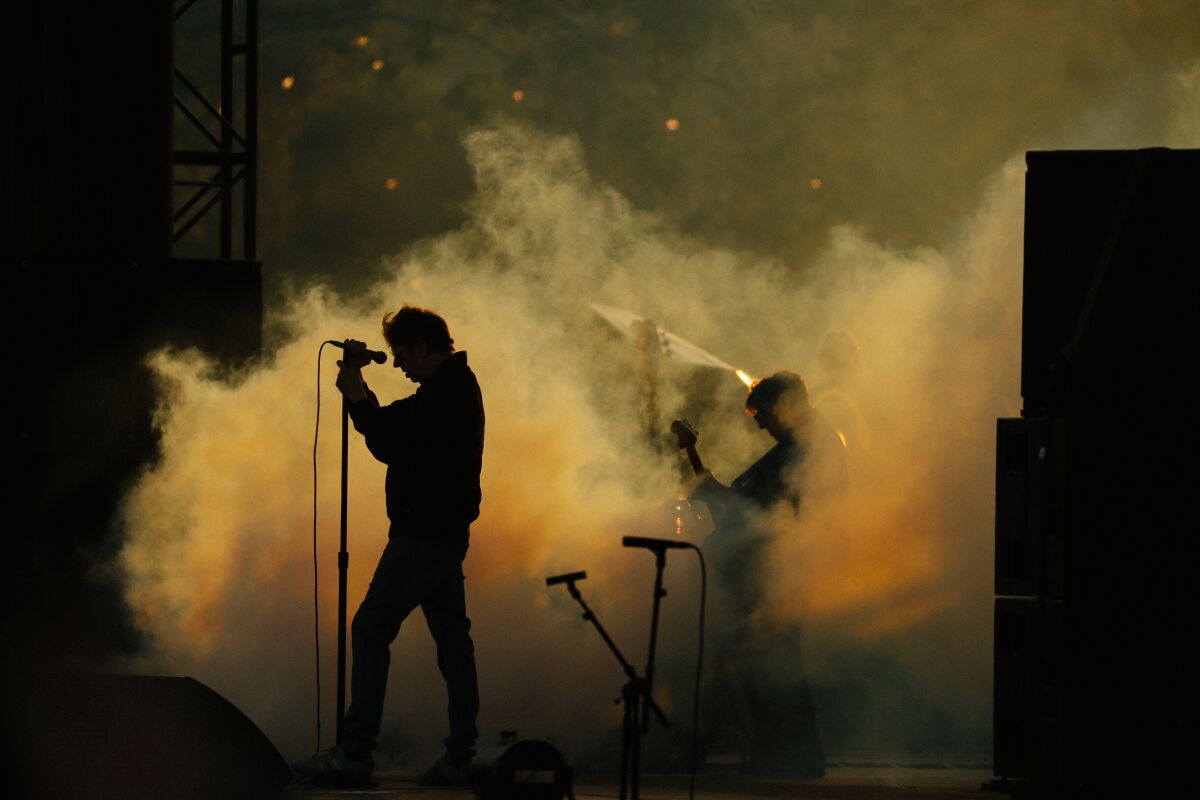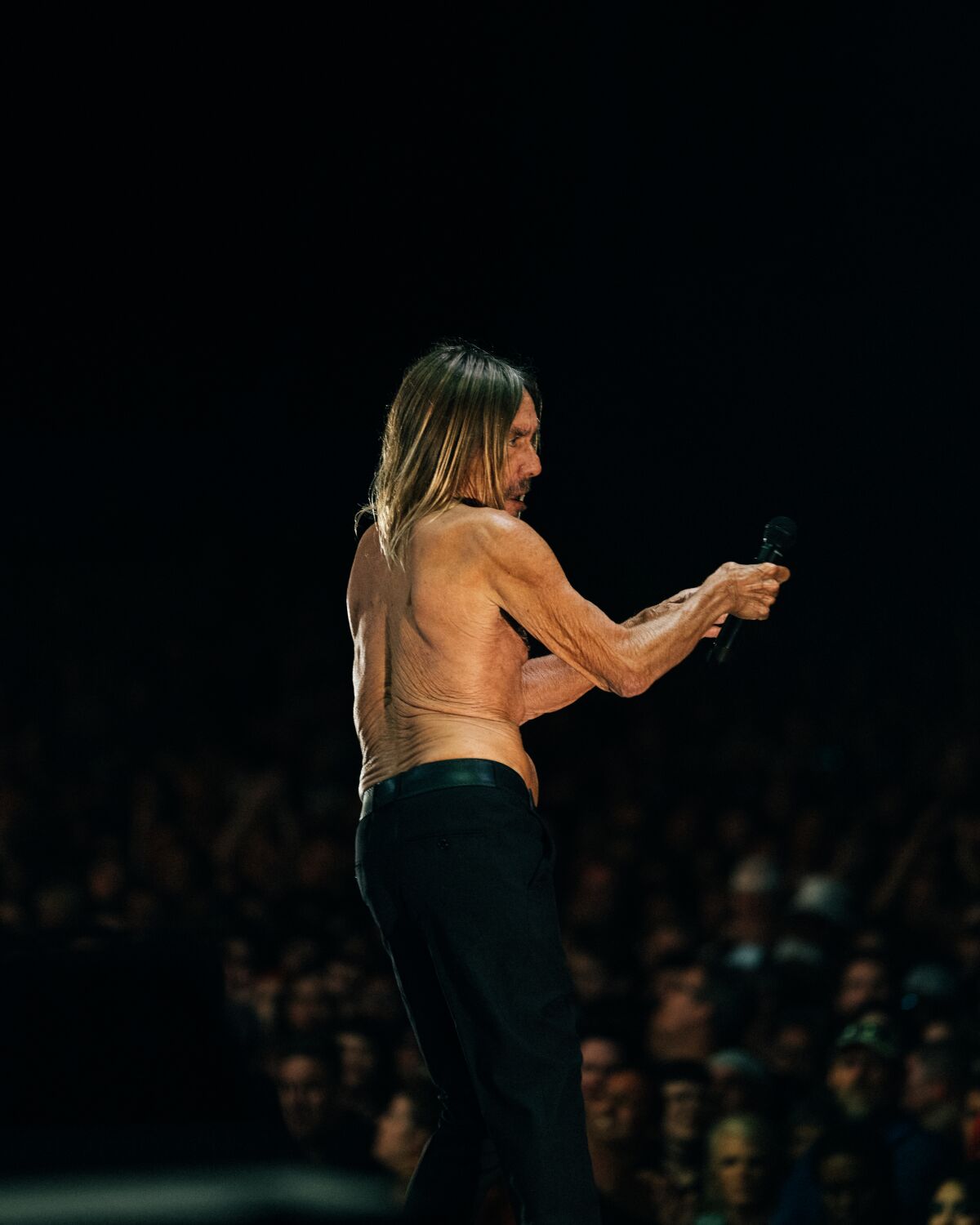Unexpectedly, two nights of classic goth and post-punk at Cruel World festival
The day before Saturday’s Cruel World festival, the promoters tweeted out a weather advisory: “Mostly sunny, high of 79, 100% chance of angst and despair. See you there.”
The weather, it turned out, had other ideas. But on Saturday a horde of mope-rockers and goths clad in sun-absorbing black descended upon Pasadena’s Brookside at the Rose Bowl. Quite possibly this was the densest concentration of fishnet in human history.
Cruel World, which debuted in 2022, has fun with the idea of misery as a shared alt-rock worldview. The festival’s three stages are named Outsiders, Sad Girls and Lost Boys. There’s also a dance area, deejayed by someone called Club Doom Dave. Then there’s the name itself, derived from the suicidal kiss-off “goodbye, cruel world.”

The goths turned out for Cruel World.
(Allen J. Schaben / Los Angeles Times)
In goth, the cruelty of the world doesn’t have a political dimension: It’s not a reference to economic inequality or the literally hateful policies being enacted all around the country. “Cruel” is a more timeless, existentialist accusation about a sadness inherent to life itself. The connection between the bands and their fans was forged during adolescence, that time when sensitive souls start having deep thoughts. Yet most of this largely middle-aged crowd must surely now be well-adjusted and comfortable in their skin (not to mention comfortably off, given ticket prices that range from $159 to $799). Many even brought morose, awkward teenagers of their own.
The key to goth’s transgenerational appeal is its odd blend of glum and glam. Before the term goth settled into place, the emerging movement was briefly known as “positive punk.” That might seem an odd adjective given the dark worldview, but the positive part is the element of dress-up and cosplay, the sheer effort that goes into self-beautification. It’s a perennially seductive style whose sepulchral glamour appeals as an alternative to mainstream ideals of blondness and tanned health — especially in SoCal. The heavy black eyeliner and white-face makeup, the holey fishnets and ratted hair — these also serve as a beacon to fellow misfits, a way of finding your tribe while scaring off the normals. It’s a forbidding look that also suggests the forbidden — a taste for sin and kink, with a hint of demonic cruelty. Despite the ungodly appearance, it’s probably the most gentle of youth subcultures: visually a kick in the eye, but in truth, it’s goths and their emo descendants who are often victims of violence rather than the other way around.
My favorite garment at Cruel World was a simple homemade T-shirt bearing the slogan “No, I Don’t Want to Hear the New Stuff.” Gary Numan, though, didn’t seem to have gotten the memo. Despite making his name with doomy dystopian electropop, he stubbornly treated the audience to a heaping portion of late-period stuff: grinding industrial rock from a phase when he appeared to be following the lead of Nine Inch Nails and Marilyn Manson. Numan did play his classic “Cars.” And you have to appreciate the effort he’s putting into looking the same as he did in his heavy-rotation MTV days.

Gary Numan performs on Saturday at Cruel World.
(Allen J. Schaben / Los Angeles Times)
Not everyone attending Cruel World was a goth, and angst wasn’t the only thing on the menu. Squeeze (a last-minute replacement for Adam Ant) sounded as cheery and ebullient as ever. Still boyish-looking at 65, Glenn Tilbrook sang the group’s post-Beatles classics like “Pulling Mussels From a Shell” with ageless sweetness. Billy Idol is looking a little craggy these days and the rebel-sneer lip doesn’t curl like it used to, but he was in fine voice and roused the second-stage crowd with hits like “Dancing With Myself” and “Rebel Yell,” interspersed with consummate showman patter.
ABC and the Human League also come from that early MTV moment of the Second British Invasion: post-punk artists who glossed up and crossed over. Both hail from Sheffield in the northeast of England, an original bastion of goth, but have no truck with miserabilism, writing songs (“Tears Are Not Enough” and “Blind Youth,” respectively) that are militantly optimistic.
Then there’s Gang of Four, whose bleakness, inspired by the ravages of capitalism, is quite different from goth’s, and who offset it with a grim resoluteness. They were as powerful a live band as ever, with singer Jon King exerting himself so vigorously he had to sit on the monitor at the front of the stage between songs to catch his breath.

Echo & the Bunnymen’s Ian McCulloch performs at Cruel World.
(Allen J. Schaben / Los Angeles Times)
Drifting nearer the dark side, Echo & the Bunnymen have songs about death (“The Cutter”) and despair (“All My Colours”). But they are delivered with such drive and dazzle, the effect is uplifting. On songs like “Rescue,” Ian McCulloch’s sonorous baritone recalls Jim Morrison at his most majestic. Most of the Bunnymen’s songs traffic in windswept romanticism full of elemental imagery. They didn’t go in much for stagecraft: There were some thin wisps of dry ice but the video screens were off and there were no back projections, as McCulloch stood stock still throughout. But the songs and the singing were more than enough.
And then, Cruel Nature struck. Midway through a taut and joyous set by the Human League on one stage and a middle-schooler dancing to Iggy Pop’s “The Passenger” on another, the show came to an abrupt halt. The audience was instructed to leave the festival site and seek shelter because of an approaching lightning storm.
And then the even crueler twist: The threatened bolts of lightning, the thunder, rain and pea-sized hailstones never reached Pasadena.

Iggy Pop performs at Cruel World.
(Nicolita Bradley / Cruel World)
To the credit of promoter Goldenvoice and the headliners, Cruel World did manage to reschedule the performances of Iggy Pop and Siouxsie for the following night. “Déjà vu, baby!” said Pop on Sunday, acknowledging the “Groundhog Day” vibe of reassembling. I first saw Pop live in 1988 and he seemed venerable even then, a rock ’n’ roll survivor, albeit with implausibly limitless reserves of energy. Thirty-five years later, at 76, he’s still ridiculously dynamic. Bounding around the stage shirtless with a disconcerting lope that suggests something’s off with his hip, he simultaneously owns his ancientness and defies it. He couldn’t quite summon the lung power for the cyclone howl that splits apart the original “TV Eye,” so during that section stuck the microphone into his waistband where it poked out suggestively. But for the most part, ably supported by his band, Pop powered through deathless classics like “Raw Power,” “Gimme Danger,” “Sick of You,” “I Wanna Be Your Dog” and “Search and Destroy.” Clearly, a man determined to rock until he drops.
Dusk descended and finally the Goddess of Goth took the stage. Siouxsie relived the trauma of the previous night, joking that she told the fire department the lightning was “just part of our f— light show.” Initially cloaked in a medieval-looking hood, she wore a silver jump-suit that shimmers in the light. Her voice has grown deeper with the decades, but this lent her singing even more baleful authority, evoking some kind of vengeful spirit of matriarchy. The set started with “Nightshift” and “Arabian Knights,” both from “Juju,” the 1981 album that is goth’s Rosetta stone. It’s Siouxsie without the Banshees — guitarist John McGeoch is dead, drummer Budgie is now Siouxsie’s ex-spouse and who knows if bassist and band co-founder Steve Severin was invited or consulted? But the Banshees surrogates onstage did a fine job duplicating the glassy guitar, the pummel-drone of the bass and the tumbly-tribal rhythms.
Siouxsie’s return was a qualified triumph: There was a touch too much turgid dirge in the set list, and as her energy level flagged, the voice grew unwieldy. But with a glorious rendition of “Happy House” and the stunning encores “Spellbound” and “Israel,” the idol earned her ovation.
For all the latest Entertainment News Click Here
For the latest news and updates, follow us on Google News.
